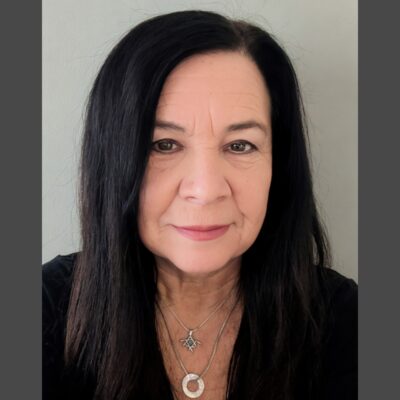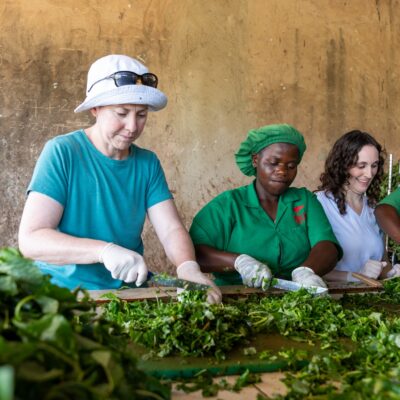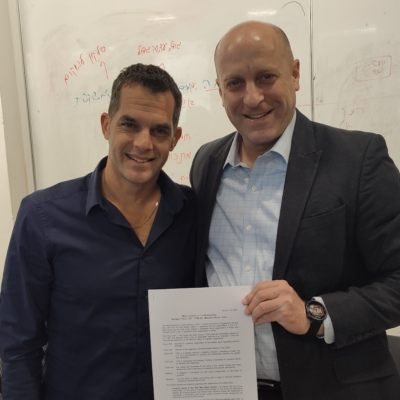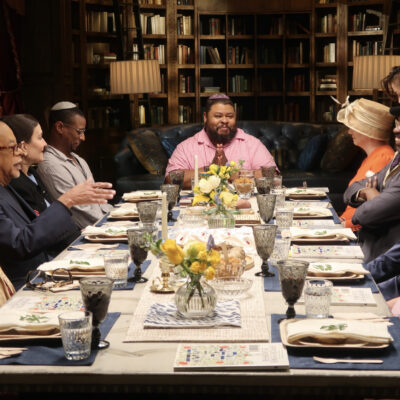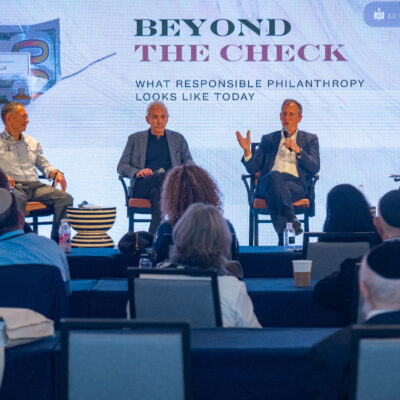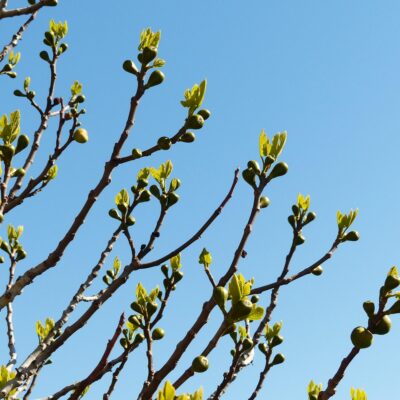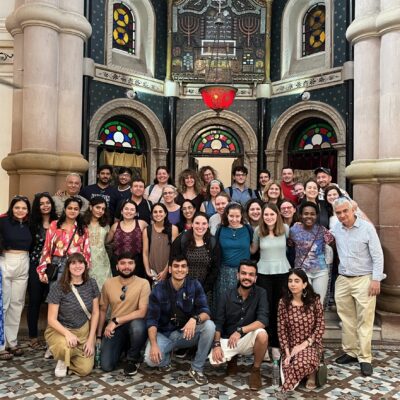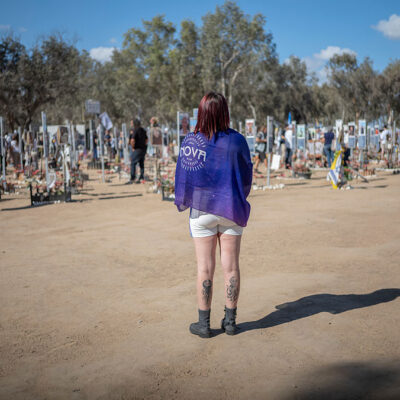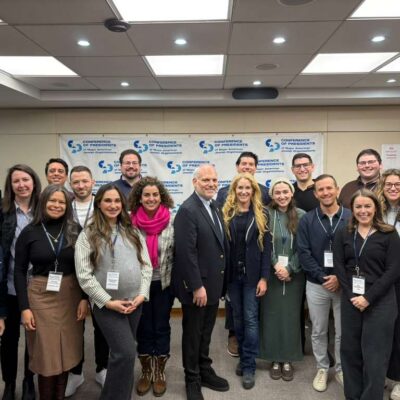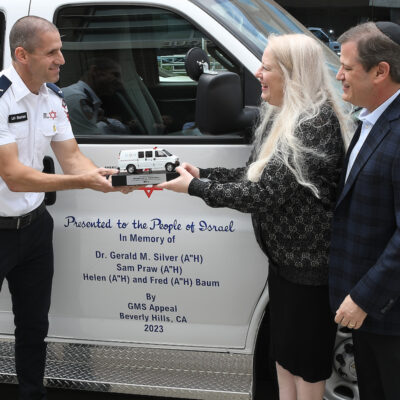Beyond basketball
JCC Association looks to expand Israel programming post-Oct. 7 in partnership with Israel’s Diaspora Affairs Ministry
Joint funding initiative ‘Mithabrim’ was meant to focus on events around Israel’s national holidays in the spring, but the organization is now looking to use that funding to ‘do more, more quickly’

Courtesy/JCC Association
Members of a JCC Association solidarity mission to Israel visit Kibbutz Kfar Aza, one of the hardest hit communities in the Hamas attacks, in November 2023.
JCC Association of North America is accelerating a partnership with the Israeli Diaspora Affairs Ministry in order to ramp up JCCs Israel-related activities in the coming months and expand their role in developing a sense of peoplehood within their communities, the organization’s CEO told eJewishPhilanthropy.
Dubbed “Mit-habrim,” meaning “connecting,” the funding initiative was first devised in 2021 under former Israeli Diaspora Affairs Minister Nahman Shai and signed under the current minister, Amichai Chikli. The initial goal of the program was to strengthen JCC programming around Israel’s Holocaust Remembrance Day (Yom HaShoah), Memorial Day (Yom HaZikaron)and Independence Day (Yom HaAtzma’ut), which are held over the course of eight days each spring.
“In the aftermath of Oct. 7, we went back to the ministry and said we’d be very eager to develop resources more committedly and more directly so that JCCs can respond immediately with greater solidarity,” JCC Association CEO Doron Krakow told eJP. “We have begun with a host of programs already, some digitally and others in person.”
Krakow said the initial vision for the partnership was to fund a smaller number of Israel-related programs over a period of two years. The plan now is to adopt an “expedited time frame” in order to “do more, more quickly.” The “Mithabrim” initiative provides $7 million in dollar-for-dollar matching from the Diaspora Affairs Ministry for relevant programs.
“We originally looked at this agreement as anchoring ourselves around these important days on the Israeli calendar in the spring, which are also important days in the JCC Movement’s calendar, which are also when expatriate Israelis are most significantly engaged with JCCs,” Krakow said. “But obviously, as the events of the world have changed, the focus is to try to do much more — more quickly and much more dynamically… to help the North American Jewish community be supportive of Israel and Israelis as they contend with the aftermath of Oct. 7.”
This includes: bringing speakers from Israel to JCCs; hosting “Together We Shine Bright” Shabbatot solidarity programs (one of them this coming weekend, and another scheduled for Jan. 26-28 around the holiday of Tu B’Shvat); bringing survivors of the Oct. 7 attacks to speak at JCCs as part of a “Giborim,” or heroes, series; solidarity missions to Israel by JCC leaders; holding Israel education programs; and hosting events around Yom HaShoah, Yom HaZikaron, and Yom HaAtzma’ut at JCCs as initially planned.
This initiative is part of a growing effort by the JCC Association to expand its role in the Jewish community, from serving as a mere host for events to using its platform to instill values and ideals in its members.
“I and the JCC Association leadership had hoped and anticipated that we would move JCCs into an increasingly prominent place in local Jewish community leadership,” Krakow said, “and I think this initiative is an example of the ways in which we are rising to meet the moment as part of a durable strategy to become important and prominent in guiding and shaping the next generation of the Jewish community.”
For Krakow, the Israel connection is also a personal one. He has spent much of his time since Oct. 7 in Israel, where his son, who serves in a reserve unit that has been fighting in Gaza, and his daughter-in-law and grandson live.
“We believe that we have been insufficiently committed in ensuring that Israel was a cornerstone of Jewish community-building in North America and we have been leaning into redressing that issue for some time,” Krakow said.
This push for Israel engagement by the JCC Association could also be seen over the summer when the JCC Association hosted the JCC Maccabi Games in Israel for the first time in over a decade and announced plans to continue doing so regularly.
Samantha Cohen, the group’s vice president for program and talent and head of JCC Maccabi, told eJP at the time that the organization and its backers saw the games as a way to get “the kids who otherwise would not be coming to Israel and would not be engaged in organized Jewish life” to come to Israel and interact with other Jewish teenagers.
“Funders recognized that this was a huge opportunity to do something, to really move the needle on Jewish teen engagement with Israel,” Cohen said.
The JCC Association does not control the programming of individual JCCs so it can only encourage and incentivize them to hold these Israel-related events.
“Every program that we’re offering is an option for JCCs, not an obligation. Almost all of the programs that we’re offering are either funded and supported by us… or we’re providing matching grant funding for programs that the JCC is doing that are consistent with the guidelines — for example, these solidarity Shabbatot,” Krakow said.
Krakow said this was all part of the JCC Association’s efforts, which predate the Oct. 7 attacks, to use JCCs to further ingrain the concept of Jewish peoplehood and a connection to Israel in the communities they serve.
“In a period in which we’ve seen declining participation in so many sectors of Jewish life, the fact that the JCCs remain an extraordinary locus of engagement by the broad, diverse population of North American Jews obliges JCCs to take a more prominent role in evolving and developing strategies for growing Jewish community, and that has to include engagement with Israel,” Krakow said.
“And we are embracing that responsibility. We were embracing it before the events of October 7th, but in the face of October 7th, to be a place that hosts a million Jewish in-person [and online] visits a year obliges us to rise to the occasion. We also welcome more than a half a million people from beyond the Jewish community every week in JCCs, so as a grassroots community relations paradigm, we have terrific responsibility with that concern as well,” he said.

 Add EJP on Google
Add EJP on Google




